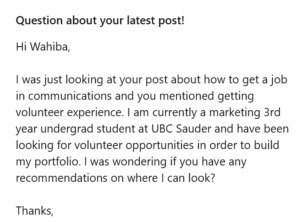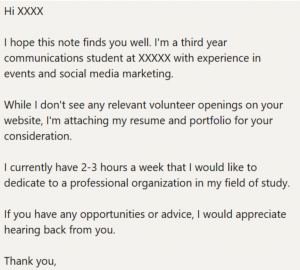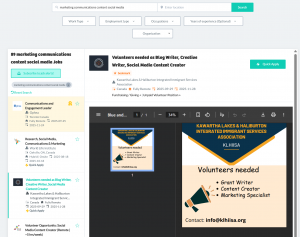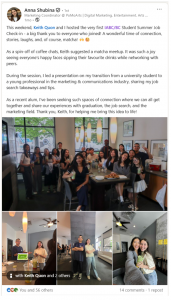You’ve heard it over and over again: volunteering helps you build your experience, portfolio, and connections. But the reality is that most students and new communicators I speak to are unsure of how to get started.
The other day I received this message in my LinkedIn inbox.
Here are some ways to discover and make the most out of volunteer opportunities:
Connect with Professional Associations
Professional associations are often run by volunteers and can be a great way to gain experience in marketing, PR, and communications.
In BC, consider:
- IABC/BC – International Association of Business Communicators
- CPRS Vancouver Chapter – Canadian Public Relations Society
- BCAMA – British Columbia chapter of the American Marketing Association
Tips to get started:
- Volunteer roles may not always be advertised, so pitch your skills. Identify a contact (e.g., Director of Volunteers) and send a concise email or LinkedIn message (as shown below).
- If you don’t have a portfolio yet, attach your best assignments as samples.
- Many associations allow you to start volunteering before becoming a member, so you can “test out” the organization. For instance, you can volunteer with the IABC/BC for six months as a non-member.
The worst thing that can happen is that they may keep your name for future consideration. But at least, you would have made that connection.
Research Volunteer Sites and Not-for-profits
If you’re interested in the social impact space, there are national, provincial and local sites which act as matchmakers with not-for-profits.
But since not all roles could be relevant to communicators, you can use filters for marketing and communications positions.
Here is a list of helpful sites and search tips:
| Platform | About / Search Tips |
| CharityVillage | Filter by “Communications / Marketing” and select “Volunteer / Unpaid” |
| Volunteer BC / Volunteer Now | Search by region and enter keywords like “communications” or “outreach” |
| GoVolunteer (Volunteer Connector – BC) | Use search terms like “communications”, “marketing”, or “PR” |
| Volunteering Vancouver | Filter by category; e.g. “PR / Marketing / Social Media” |
| City of Surrey – Volunteer Opportunities | Browse City of Surrey listings and search for event support, marketing, or social media |
| Langley Volunteers | Local volunteer hub; check for nonprofit comms/marketing roles in Langley |
Some of these roles can be fully remote, which is an added bonus. Short-term roles can also be great for testing whether there’s a fit with the organization.
If you don’t find anything of interest, you can subscribe to the alerts.
You may also look-up a cause you care about and pitch them the idea of supporting their events in the form of content creation and promotion; e.g. video production, blog posts etc. Having a clear and specific scope will help them say “yes” and help you “own” that deliverable for your portfolio.
Leverage Your School Network
Your college or university likely has internal opportunities to contribute to student clubs and events. For instance, the Faculty of Communication, Art, and Technology at SFU has a helpful resource page for students.
If you don’t find what you’re looking for, you can lean on your professors, who may be your best advocates.
In a recent episode of The Comms Major podcast, Kelsea Arbour, a recent graduate of KPU’s public relations program, shares how she landed her first volunteer role through a professor.
This volunteer role ultimately led her to her first communications job at Fortis BC.
Building good relationships with your professors and mentors means that they will think of you when the right opportunity comes up. You could also message them directly to stay top of mind. While it seems simple, finding a relevant volunteer role which fits your interests and schedule takes time and lots of patience – just like job hunting.
You Found a Volunteer Opportunity. Now What?
Here are some quick tips to make the make the most out of your new role:
- Set clear expectations, from the beginning: Clearly communicate how many hours you are able to put in (weekly or otherwise), understand the scope of your work/deliverables, and who you will need to report to and/or can seek guidance from (e.g. a mentor).
- Work with the end in mind: Yes, you will gain some skills but ideally, what would you like to get out of this volunteering role? This could take the form of a portfolio piece, a LinkedIn recommendation, or even a letter of reference.
- Grow with the role: As you prove yourself and get to know the organization, don’t be afraid to pitch new ideas for greater learning and exposure.
For instance, IABC/BC member and volunteer, Anna Shubina, recently pitched the idea of a Student Summer Job Check in, which ended up being a great success
As Kelsea put it in her podcast episode: “Treat volunteering like your first job!”
The payoff is well worth it
According to LinkedIn, 41% of hiring managers view volunteer work as equally valuable as paid experience, while other research shows volunteers are 27% more likely to find a job.
Share Your Story
Do you have a volunteer success story to share? Are there other resources or tips we could add to this list? Feel free to also add any questions to the comments.
About The Author
Wahiba Chair is an assistant professor at University Canada West and the Director of Students & New Communicators at the IABC/BC. You can connect with her on LinkedIn.













